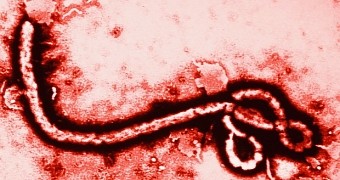An experimental Ebola vaccine developed by the Public Health Agency of Canada was shown to offer 100% protection against the deadly virus in a trial carried out in Guinea earlier this year.
As part of the trial, detailed in a report published in yesterday's issue of the medical journal The Lancet, the vaccine was administered to people who were at high risk of contracting the Ebola virus, i.e. people who had come into contact with individuals diagnosed with the deadly disease.
Of the over 7,600 people who were vaccinated, not one contracted the virus. Admittedly, this trial was merely a proof-of-concept and further investigations are needed to confirm that the vaccine can in fact prevent an Ebola epidemic. Nonetheless, scientists are quite satisfied with how things turned out.
“This is an extremely promising development,” World Health Organization researcher Margaret Chan said in a statement. Furthermore, “An effective vaccine will be another very important tool for both current and future Ebola outbreaks.”
Since the debut of the latest Ebola epidemic in West Africa in late 2013, the virus has infected and killed over 11,000 people. The epidemic, by far the largest to date, is still ongoing in some regions.
The experimental vaccine might help end it
Health officials agree that, to end the epidemic, herd immunity is the best way to go. Thus, they argue that one sure way to keep the virus from spreading is to immunize large groups of people so as to disrupt potential chains of infection.
This is precisely what was attempted in the trial that was carried out earlier this year in Guinea. By vaccinating individuals who had come into contact with Ebola patients and who were at high risk to be infected, health workers kept them from developing the disease and passing it on to others.
This strategy, known as ring vaccination, was also employed to eradicate smallpox in the 1970s. In the Guinea trial, the vaccine was also administered to subsequent contacts of individuals who had had direct contact with Ebola patients. As mentioned, no new cases were documented.
“The premise is that by vaccinating all people who have come into contact with an infected person you create a protective 'ring' and stop the virus from spreading further,” said infectious disease specialist John-Arne Røttingen with the World Health Organization.
The trial commenced on March 23. Given its encouraging outcome, it was allowed to continue. Since no significant side effects were reported, health officials are considering administering the vaccine not just to adults but also to children and teenagers between the ages of 6 to 17.

 14 DAY TRIAL //
14 DAY TRIAL // 

